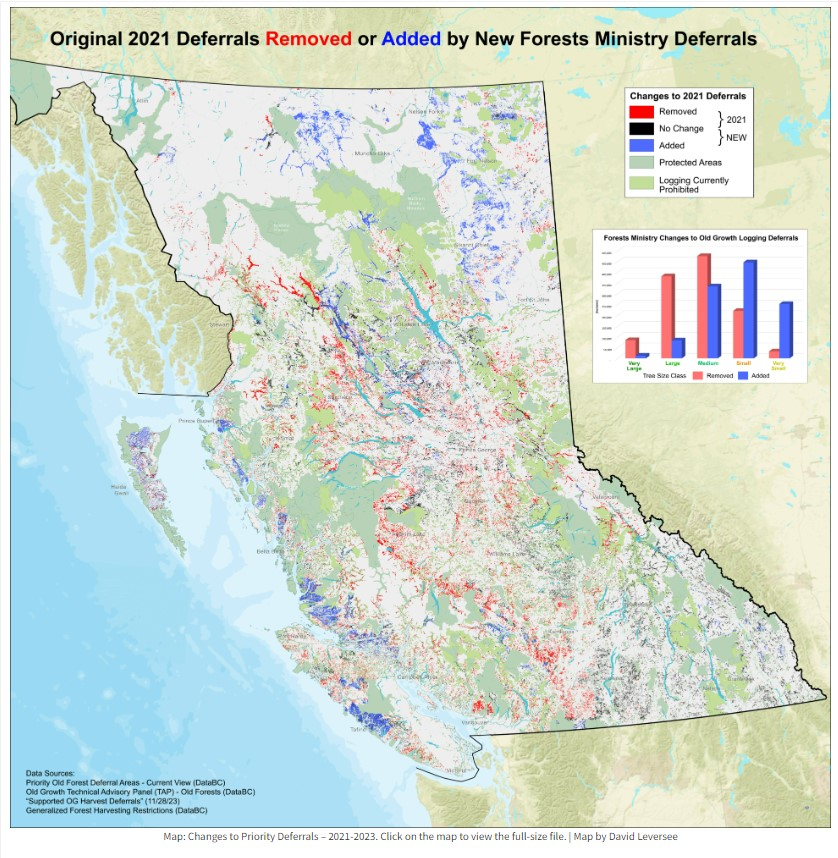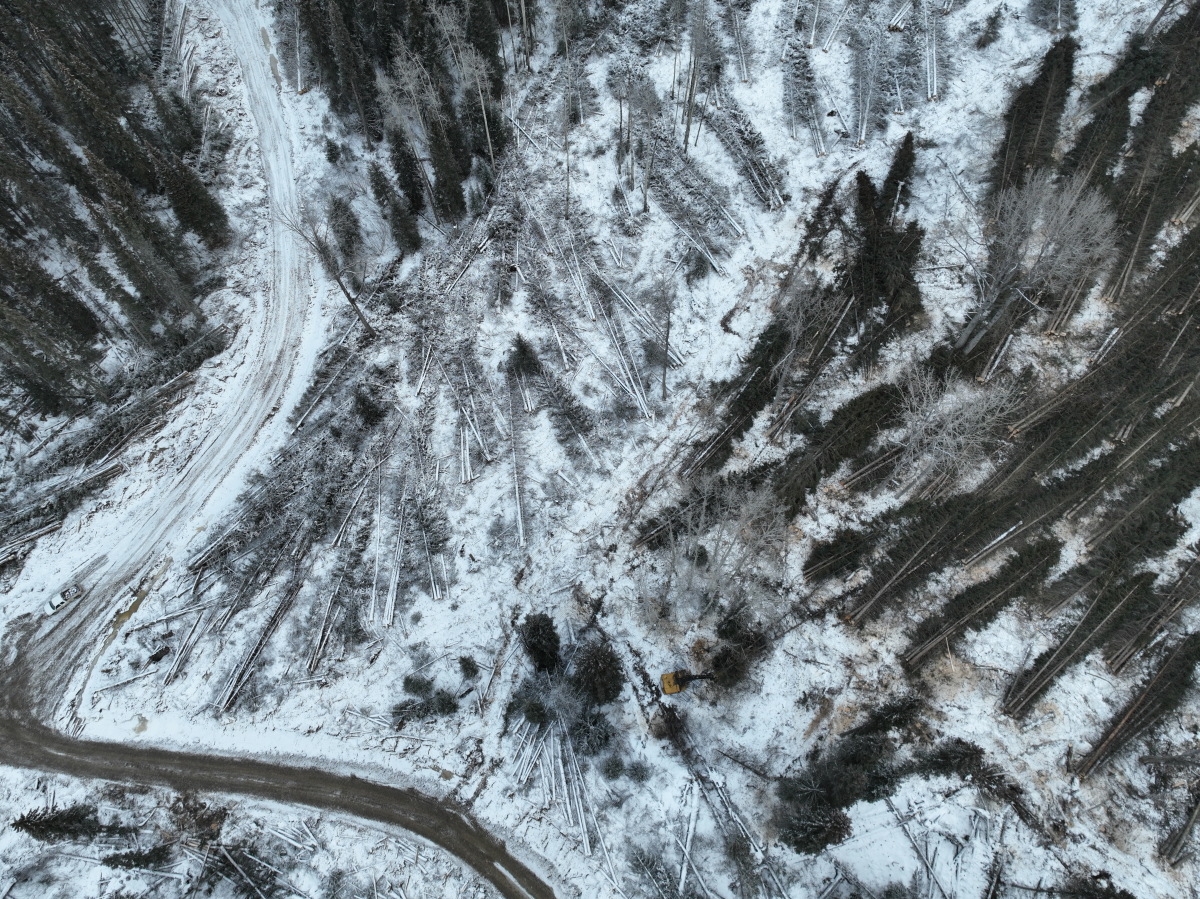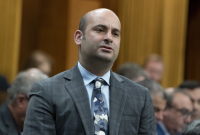Support strong Canadian climate journalism for 2025
Two new reports find B.C.’s old-growth forests are still on the chopping block despite claims to the contrary by the provincial government and a U.K.-based corporation.
Government data leaked to the Canadian Centre for Policy Alternatives (CCPA) shows B.C.’s Ministry of Forestry rejected more than half the proposed logging deferrals recommended by an expert panel with a mandate to protect important old-growth forests.
The CCPA report analyzed and mapped the leaked data, which originated in a password-protected file on a ministry file-sharing website and was shared anonymously with the think tank. The analysis shows ministry personnel removed 55 per cent of the areas of large old-growth trees the panel recommended be protected from logging.

“It really does kind of underscore how the Ministry of Forests, for decades, has effectively been captured by the industry that it regulates,” said Ben Parfitt, resource policy analyst with the CCPA B.C. and author of the report. “Large numbers of old-growth forests with the very best trees are being lifted from deferral status and more deferrals are being moved to forests that have much smaller, less commercially desirable trees,” Parfitt told Canada’s National Observer in an interview.
BC United MLA for Prince George-Mackenzie Mike Morris said it's “alarming” that “there's bureaucrats within the government [who] would manipulate data like that.”
“Are they doing it at the request of the minister or are they doing it on their own volition? I don't know,” he said, adding the government needs to be held accountable.
Morris said these are his personal views, not his party’s position. Morris advocates for forestry reform and said it's “heartbreaking” the government hasn’t recognized the “clear and present danger” of primary and old-growth forest loss caused by the last 60 years of clearcutting.
Minister of Forests Bruce Ralston said the leaked data “confirms what we have been saying all along — that 2.42 million hectares of old-growth forests are deferred or newly protected since November 2021.”
“This includes 1.23 million hectares of priority at-risk old-growth identified by the Technical Advisory Panel,” said Ralston in a statement emailed to Canada’s National Observer.
The panel’s mandate was to provide science-based recommendations on which old-growth forests should be protected. In 2021, the panel submitted a map to the province recommending it defer logging for about 2.6 million hectares of forest that were, in the panel's view, most important to protect.
Ralston said some First Nations supported those recommended deferral areas, while others wanted “alternative old-growth land” to be deferred instead. He did not specify which First Nations.
Parfitt described the Ministry of Forests’ decision to remove and add certain deferrals as a “shell game.”
“What's being shifted back into the logging column is, generally speaking, big trees and what's being shifted into deferred status is generally small trees,” said Parfitt.
Morris thinks this is perhaps something the Office of the Ombudsperson should look into.
The province is “taking action on all the recommendations of the Old Growth Strategic Review,” said Ralston. “Deferrals are one step we are taking to conserve our oldest and rarest forests.”
“The [BC] NDP keeps claiming that they're different and that they paid attention to their expert panel” and announcing they won’t log old-growth, said federal Green Party Leader Elizabeth May. “How dare they continue to lie to people and think that voters are going to believe them?”
If deferrals are only “one step” the province is taking to protect old-growth forests, what other tools are there? Parfitt asked. “Because if you don’t defer logging of these forests, nothing will be left.”
Logging these “irreplaceable” old-growth forests does long-term damage, both in terms of carbon emissions and the more obvious impacts to ecosystems, said May.
“It's really contempt for the public trust.”
B.C.’s old-growth forests continue to fuel a biomass power plant in the U.K., according to a new investigation by Conservation North, the Bulkley Valley Stewardship Coalition and Biofuelwatch UK. It found Drax Group — a U.K.-based power company and wood pellet producer — “continued to source logs from old-growth as recently as January 2024,” said Len Vanderstar of the Bulkley Valley Stewardship Coalition.
“What is also upsetting is the fact that these forests are a significant component in carbon capture and should not be used to generate electricity in the name of climate change mitigation,” said Vanderstar in the March 11 press release. The groups behind the investigation say the U.K. government should stop giving sustainability subsidies to Drax, which operates the world’s largest wood-fired thermal electricity plant in Yorkshire, U.K., and is considered a renewable energy company. Natural Resources Canada considers forest biomass a renewable feedstock for energy production as long as it comes from a sustainably managed forest and regrows over time. Many environmental groups disagree.
When contacted about the investigation, a spokesperson directed Canada’s National Observer to a web page with public statements on its website that say the company is “confident our biomass is sustainable and legally harvested.”
“In October 2023, Drax made the decision to stop sourcing wood fibre directly from harvest sites which overlap with Old Growth Deferral Areas,” reads the statement, attributed to a Drax spokesperson. “Fibre that Drax has sourced from publicly owned forests in British Columbia has been designated as being available to harvest legally and sustainably by the Government of British Columbia, alongside First Nations.”
The investigation analyzed publicly available data, including the provincial government’s Harvest Billing System, and cross-referenced those findings with recent satellite imagery — or an in-person visit — to confirm whether cut blocks had been logged.
This isn’t the first time Drax’s sustainability claims have been called into question. In October 2022, a BBC investigation found the company sourced some of the biomass it burns to create electricity from whole trees in B.C.’s primary forests — not just sawdust and waste wood, as the company claims.
“Logging in British Columbia is not a climate solution in the U.K.,” said May.
The federal NDP did not make an MP available to comment on the leaked data and Drax investigation. Multiple federal Conservative MPs did not respond to a request for comment by deadline.
The federal government has pledged to protect 30 per cent of Canada’s lands and water by 2030. B.C. has since said it will protect 30 per cent of its land by the end of the decade, but the leaked data calls that commitment into question, said Parfitt.
“If what is on the forest ministry map becomes policy, it will actually undercut the ability of the federal and provincial governments to up protection of threatened landscapes in British Columbia,” he said.
Natasha Bulowski / Local Journalism Initiative / Canada’s National Observer






Comments
Thanks for putting this together Natasha. I've been following the wood pellet story for a few years now and it's interesting to see government and industry representatives are no longer denying that they're harvesting trees for wood pellet production. For the longest time they claimed the pellets were only made from sawdust and scrap wood from lumber mills. It doesn't make me feel better that they're now admitting what they're doing and trying to convince people that it's sustainable. It's also very sad that the BC government is continuing to allow old growth to be harvested. What will it take for people to come to their senses?
It's been obvious for decades that the BC forest industry is in need of an overhaul. It used to be a common refrain that the industry was heading for a "falldown" from overlogging, but that turned out to be a slow motion slide instead.
Clinging to old growth trees for harvesting despite huge public resistance and new policies meant to protect old growth, then sneaking around said policies, are signs that the whole shebang is in trouble as long as it's based on the old mind set of unsustainable harvest rates and practices abd the perception that conservation rules are flexible.
How many individuals in the ministry have an actual understanding of the complex forest ecology in each region and subregion? Forestry may be important to many rural areas, but it's not what it used to be to the provincial economy. In fact, prior to the pandemic, technology and knowledge were a larger component of overall GDP than all natural resources and agriculture combined.
BC can well afford to pause and reform the entire thing, hopefully giving conservation and ecological science a lot higher priority. Accounting for soil ecology alone would have been the basis for banning clearcutting long ago, especially on slopes -- of which BC is nothing but. Even today, it's just dirt to too many companies and ministry staff.
Reform could be part of a climate research initiative into new methods that, for example, preserves complete forest cover and that uses symbiotic plant and soil biome relationships to grow and maintain forest health in plantations. The 30m stream bank setback criteria should be pushed to at least 100m, more where slopes are steeper. Watershed protection is a crucial consideration in light of the rapidity of climate heating. Research into species loss, migration and replacement due to warming is needed now, not tomorrow, especially in areas that were damaged by extinction logging practices.
The NDP need to heed the call for better and more mature responses to the climate crisis. In BC that means putting the old attitudes on the disection table regarding forestry and LNG. The Greens are waiting in the wings to pick up their lost votes.
God Damnit, BC NDP!
If it weren't for this and the damn LNG bullshit I'd be giving them money, maybe volunteering a bit. But I will not give active support to a party being that boneheaded on such key issues.
Find those responsible for changing the old growth deferral boundaries - and fire them.